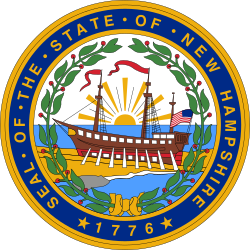| |||||||||||||||||||||
| |||||||||||||||||||||
 County results Stearns: 40–50% 50–60% 60–70% Bedell: 40–50% 50–60% | |||||||||||||||||||||
| |||||||||||||||||||||
| Elections in New Hampshire |
|---|
 |
The 1870 New Hampshire gubernatorial election was held on March 8, 1870, in order to elect the governor of New Hampshire. Incumbent Republican governor Onslow Stearns won re-election against Democratic nominee John Bedell, Labor Reform Party nominee Samuel Flint and Temperance nominee Lorenzo D. Barrows. [1]

